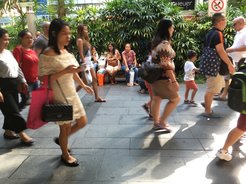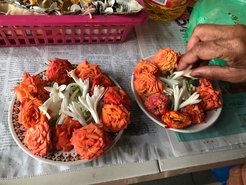Blog | October 2019
Waiting for Sundays. Fieldwork reflections
by Megha Amrith
I started writing these reflections mid-week in Singapore, impatiently waiting to get started with my most recent stretch of fieldwork with migrant domestic workers who have been living and working in the city as ‘temporary’ workers for decades. Anyone who has done research with migrant domestic workers in Asian cities knows just how important Sundays are. As their one day off per week (or even fortnight or month), it is when diverse life projects and forms of self-making coalesce, when claims to public space are asserted, and when new friendships, intimacies and connections take shape. As the anthropologist Nicole Constable wrote back in 1997 in the context of Hong Kong, ‘thousands of domestic workers continued to gather in Central on Sundays, laughing, talking, and eating en masse. They demanded to be seen and they refused to be moved’ (p.7).
Fieldwork rhythms in these contexts are undeniably structured by the highly-restrictive immigration regimes for ‘temporary’ workers, which control everything from where migrant women live (in employers’ homes), when they may go outside, up to the most intimate details of their lives. When preparing to revisit the field for this relatively shorter stay, I found myself counting not just how much time I would have overall, but importantly, how many Sundays I would have. The prospect of only being able to do fieldwork in these brief time windows dampened my ethnographic aspirations to be immersed, in some sense of the word, in everyday fieldwork. While I have always taken inspiration from the vast literature on doing contemporary ethnography - of being in multiple fields, doing ethnography at home, and on the fluidity of urban ethnography - I was still anxious about not having enough time with the people whose life histories I sought to understand. When I arrived in the field once again, so too did that familiar feeling of waiting for Sundays.
When Sundays finally did arrive, they would be very busy – as were the Sundays of my interlocutors. My day would involve running all over the city from early morning till night meeting people and attending events, the organisation of which required a lot of careful planning. Other times, I followed the Sunday itineraries of specific women from one neighbourhood to another, hopping on and off the MRT and bus, talking walks and eating together. Kumari, a domestic worker from India told me ‘I didn’t sleep last night, I was so excited. I only went to sleep at 3.30 am, I am just thinking I want to go now, I want to go and see my friends again’. And as much as domestic workers would look forward to this ‘event’ of being in a time-space so different to their daily routines, there were times when this would not materialise. On one of the first Sundays, I was meant to meet with Mel from the Philippines, but she cancelled at the last minute saying that she could not go out anymore because her employer was unwell and so she had to look after the children in the house. It was a reminder of how fragile, elusive and arbitrary these rights to rest can be, and of the demands and contingencies of care work that low-wage migrant women are expected to respond to.
My fieldsites ranged from the more familiar spaces of migrant conviviality, like specific shopping malls (for those familiar with Singapore, Lucky and City Plazas on Sundays are well-known), churches and temples, but also school campuses-turned-Sunday-training-centres where migrant women enroll in classes on how to save for retirement and ‘grow’ their money; food courts; benches of all sorts under escalators, on the street, at a bus stop; a clubhouse for domestic workers; McDonalds; in parks where women picnic while also participating in village-based savings clubs.

It was interesting that how one would choose to spend a Sunday was often a point of contention, judgement and comment, reflecting complex socio-spatial politics and negotiations of friendship groups and communities. My interlocutors would often say, ‘we’re not like those who just sit there in the park all day or go to discos…or at least not anymore’. Older domestic workers, the ones who have ‘stayed for so long’, draw boundaries between themselves as those who have had to endure so much and are ‘doing something’ with their Sundays, and the younger generation of workers who arrive and whom they cast as careless and spoilt. These comments foreshadowed broader themes that have been emerging through fieldwork in other conversations on contested notions of morality and of a prevalent discourse of (neoliberal) ‘productive time’.
In my own mode of waiting, I was also preoccupied with doing things – going over my fieldnotes, photographs and audio recordings, attending talks and meetings organised by NGOs to stay updated, finding new avenues for making connections, reading other scholars’ reflections on doing fieldwork in restrictive contexts (of which there are countless examples) – like when WeChat and talking on the phone become a key part of the field (Ang, 2019); or when one speaks (or does not speak) to domestic workers through the gates of their employers’ houses (Killias, 2018). These are not merely bracketed methodological details, but deeply telling of the social and spatial lives, socialities, and containments of the people we are working with. In very few cases could I visit migrant women in their employers’ homes, given the implicit and explicit controls over space, work and bodies, which would obviously not provide an open space for conversation.
Over time, however, I found that I could meet with some people on days other than Sunday, though this was more the exception. Hema from Sri Lanka, for example, had worked out a less-rigid arrangement with her employer and would go to a Hindu temple every Tuesday and Friday to make offerings and pray to the goddess Durga, a goddess she says gives her much strength and power. Others would be out and about when their employers were travelling abroad, like during the Christmas season.

The online worlds of domestic workers also become a very significant fieldwork space for chatting and exchanging messages. Some women sent me daily Whatsapp ‘good morning’ images, a practice that was central to making, sustaining and cementing connections in these more transient and unpredictable spaces of relating (where not responding would mean cutting off a gesture towards friendship).
They also shared photos of the houses they were building in their home countries or of what they did on the previous Sunday. I stumbled upon lively Facebook groups for domestic workers (one with over 30,000 members), in which members would discuss everything from employment-related matters, advice about rights, plans for returning home, and things in life for which they are grateful. I watched online videos on ‘financial futures’ made by non-profit organisations and motivational speakers specifically for domestic workers. When recently speaking to some students about my research, they asked about the most important material object that I encountered in the field. The answer was, without a doubt, the smartphone, as the most poignant symbol and agent of connection and aspiration, crucial for the maintaining (or breaking off) of relationships and for multiple forms of self (re)presentations.

And then there were those fleeting spaces of encounter during the week – the void decks of public housing blocks where migrant women would take breaks to call their families, the times when they would walk the dog, take the bus to the market, drop by the remittance center while their employers’ kids were at school. As a fieldworker, this sometimes meant, to borrow from Pigg (2013: 127), ‘an ethnographic insistence on sitting, being, noticing, and reflecting…as a means to understanding, as a form of critical reflexivity, and as a diagnostic of the politics of relevance’.
In all the sitting, waiting, anticipating and planning within these inter-temporal spaces, I was fully aware that the kind of waiting I was doing as a researcher with privilege and with the freedom of mobility around the city, choosing where to be on any given day, was entirely different from how Kumari or Mel wait for Sundays. Yet this rhythm of slow, incremental fieldwork, which involves multiple returns to the field over a few years, has opened up new insights into these women’s lives. For a project on ageing, focused on how women stay abroad in a state of prolonged temporariness (leaving home in their twenties and staying abroad for sometimes thirty years), it feels apt to understand the slow and enduring ways that they have laboured to imagine different possible futures for themselves and their families, while creating a sense of home and belonging in this city/state – despite it being one that has curtailed their freedoms and demands that, as perpetual noncitizens, they leave at the age of 60 (something for a future blog….).
References:
Ang, S. (2019) ‘A Woman to Warm My Heart’: Low-Wage Mainland Chinese Migrant Men, Thrift and Desires for Intimacy in Singapore’, Journal of Intercultural Studies, 40:3, 287-301.
Constable, N. (1997) Maid to Order in Hong Kong: Stories of Filipina Workers, Ithaca: Cornell University Press
Killias, O. (2018) Follow the Maid: Domestic Worker Migration in and from Indonesia, Copenhagen: NIAS Press
Pigg, S. L. (2013) ‘On Sitting and Doing: Ethnography as Action in Global Health’, Social Science & Medicine 99. 127-134.










